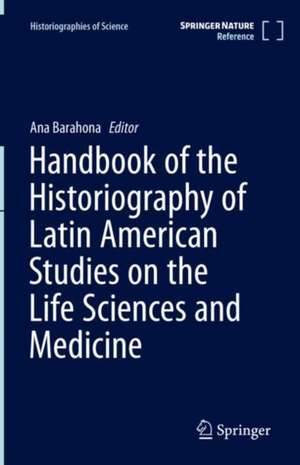Handbook of the Historiography of Latin American Studies on the Life Sciences and Medicine: Historiographies of Science, cartea 2
Editat de Ana Barahonaen Limba Engleză Hardback – 15 mai 2022
Preț: 1235.35 lei
Preț vechi: 1625.45 lei
-24% Nou
Puncte Express: 1853
Preț estimativ în valută:
236.41€ • 242.11$ • 196.66£
236.41€ • 242.11$ • 196.66£
Carte tipărită la comandă
Livrare economică 14-20 martie
Preluare comenzi: 021 569.72.76
Specificații
ISBN-13: 9783030747220
ISBN-10: 3030747220
Pagini: 536
Ilustrații: XVIII, 536 p. 16 illus. in color.
Dimensiuni: 155 x 235 mm
Greutate: 1.23 kg
Ediția:1st ed. 2022
Editura: Springer International Publishing
Colecția Springer
Seria Historiographies of Science
Locul publicării:Cham, Switzerland
ISBN-10: 3030747220
Pagini: 536
Ilustrații: XVIII, 536 p. 16 illus. in color.
Dimensiuni: 155 x 235 mm
Greutate: 1.23 kg
Ediția:1st ed. 2022
Editura: Springer International Publishing
Colecția Springer
Seria Historiographies of Science
Locul publicării:Cham, Switzerland
Cuprins
Introduction.- Natural History and Evolution.- Agriculture.- Medicine, Genetics and Radiation.- Race Studies and Science Policy.
Notă biografică
Ana Barahona studied biology and undertook postgraduate studies on the history of science at the National Autonomous University of Mexico (UNAM). She stayed at Harvard University for a year with Professor Everett Mendelsohn and was invited to the American Philosophical Society in 1984. She undertook postdoctoral studies at the University of California, Irvine, with Francisco J. Ayala, and has made several research visits to the Max Planck Institute for the History of Science, Berlin, and to Harvard University’s Department of History of Science, among others. She is full-time professor in the Department of Evolutionary Biology in the School of Sciences at the UNAM. A pioneer in the historical and philosophical studies of science since 1980, she founded the area of social studies of science and technology in the School of Sciences. She has focused on the history and philosophy of evolution, genetics, and human heredity and medicine (especially in Mexico), and on the relationship between epistemology and science education. More recently, her interests have focused on medical genetics (population genetics and cytogenetics) and the impact of nuclear physics in the development of radiobiology and genetics in Mexico during the Cold War. She has also worked on genetics and agriculture in post-revolutionary Mexico, within the framework of transnational science. Some of her xi published works include more than 70 specialized articles, several books of research, and textbooks for elementary education, middle school, and college education in biology and history and philosophy of science. She is member of the Mexican Academy of Sciences and the National System of Investigators, CONACyT. She has been president of the International Society for the History, Philosophy and Social Studies of Biology, council member of the Division of History of Science and Technology of the International Union of History and Philosophy of Science, and member of the International Committee of the Scientific Society Sigma Xi. She has served as associate editor of the journal History and Philosophy of the Life Sciences, and member of the editorial boards of the journals Biological Theory, Science & Education, Almagest, Mendel Newsletter, and Journal of the History of Biology. She has been recently acknowledged as a Regular Member of the International Academy for the History of Science and member of the International Advisory Board of the British Society for the History of Science She received the 2014 National University Award (Premio Universidad Nacional 2014), for her contributions to science and technology studies, being the highest recognition that the UNAM gives to professors who have had a distinguished career. She currently coordinates the University Seminar of History, Philosophy and Studies of Science and Medicine, and is a member of the Board of Governors of the UNAM.
Textul de pe ultima copertă
This volume provides a definitive assessment of the historiography of the life sciences and medicine in Latin America. It makes historiographic work available for new scholars to join the field and for graduate students and other scholars new to the history of science in Latin America, by means of meaningful and original contributions,.This volume brings transnational analysis to the center of global historiographical discussions. It seeks to contribute both empirically and theoretically to the fields of History of Science and Science and Technology Studies (STS) in Latin America, to account for how the knowledge produced in developing countries is part of international knowledge as it circulates in transnational collaborative networks. The volume consists of articles written by experienced, expert authors who expose the lines of ongoing research in the history of life sciences and medicine in Latin America in order to provide an overview of the multiplicity of analytic frameworks and perspectives in a way that allows them to be contrasted with each other. Some of the topics discussed include Asymmetrical networks of collaboration, Circulation, Conceptual History, History of Race, Gender and the like, and many more.
Caracteristici
The only historiographic analysis of the history of science in Latin America Provides an essential tool for any scholar wanting to make an informed contribution to the scholarship in the history of the life sciences and medicine in Latin America Offers an assessment of the state of the field from a set of distinguished international experts



